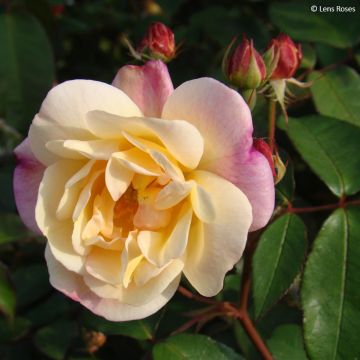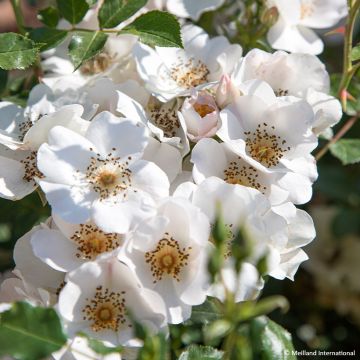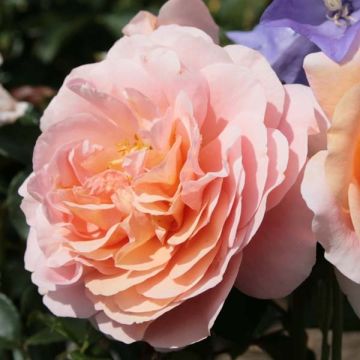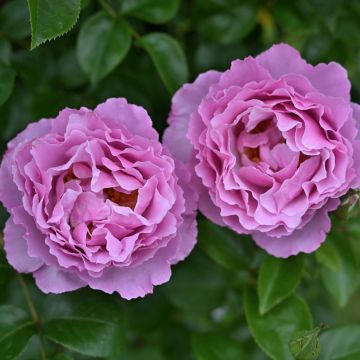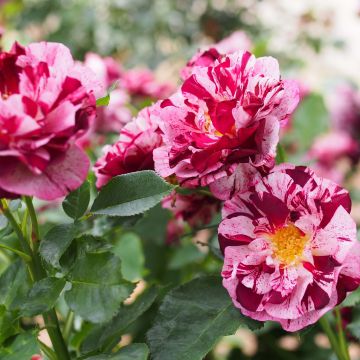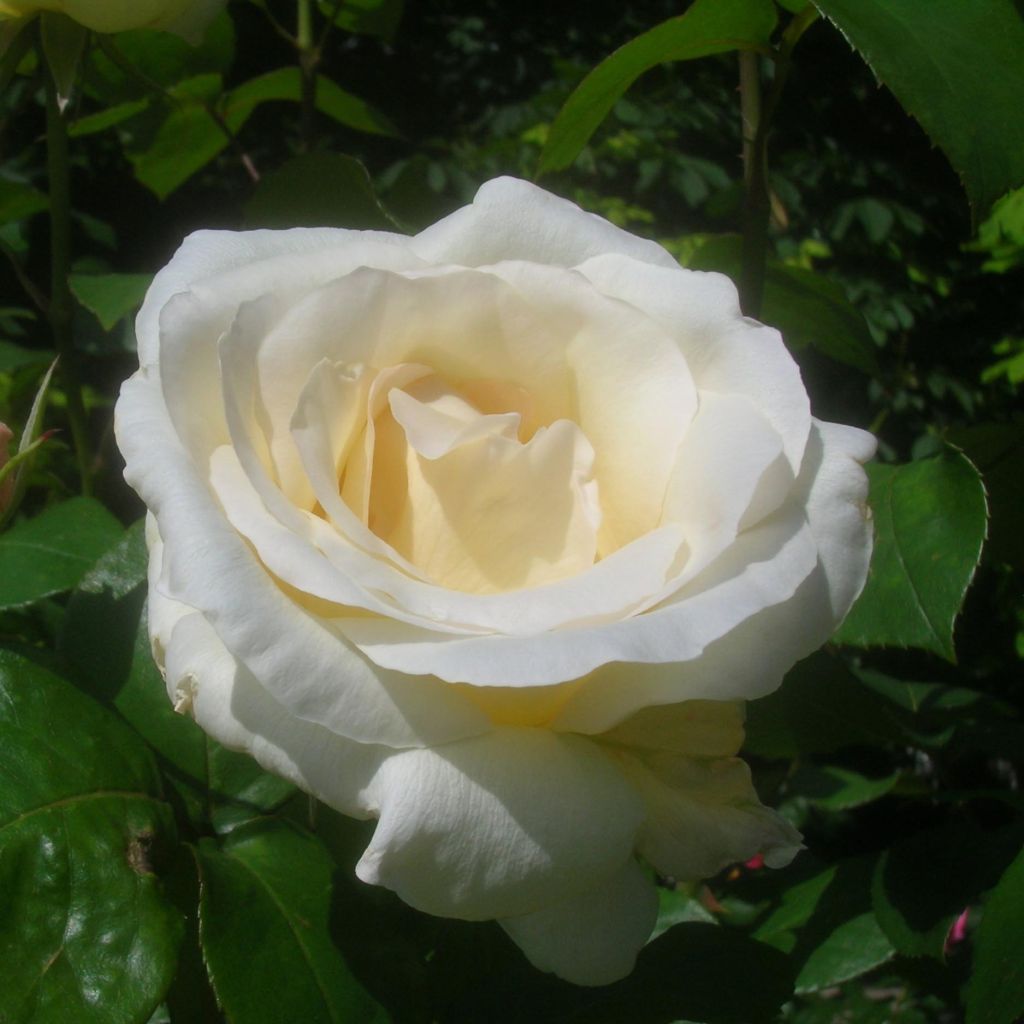

Rosa Pascali - Hybrid Tea Rose
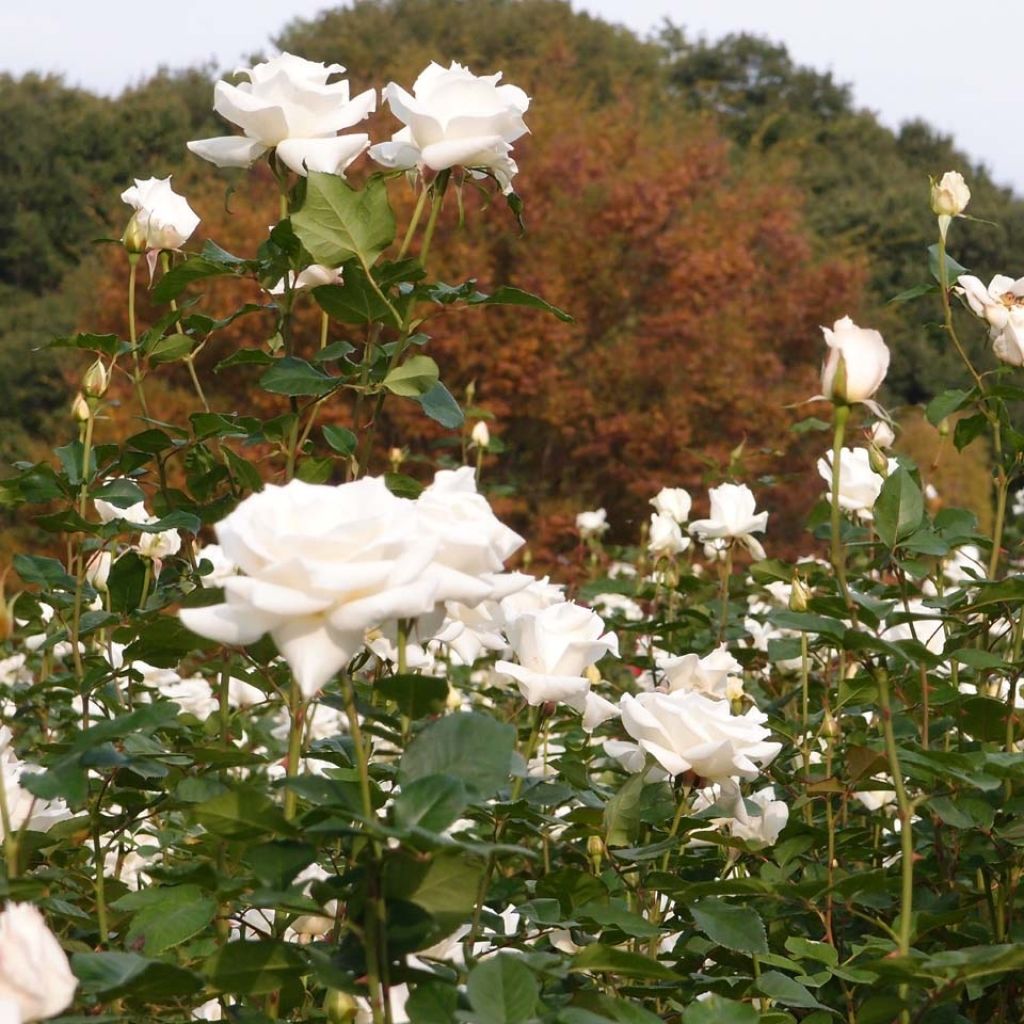

Rosa Pascali - Hybrid Tea Rose


Rosa Pascali - Hybrid Tea Rose


Rosa Pascali - Hybrid Tea Rose
Rosa Pascali - Hybrid Tea Rose
Rosa Pascali®
Hybrid Tea Rose
2nd attempt (last year this rose bush died). Thanks to the people (for the order preparation and shipping), the bare-root rose bush I received seems healthy. Planted near the 'Barbados' variety, I am now patiently waiting for it to take root... (or not?).
Thierry, 01/03/2024
This item cannot be shipped to the selected country
Delivery charge from €5.90
Delivery charge from €5.90
Delivery to Corse prohibited
More information
Schedule delivery date,
and select date in basket
This plant carries a 24 months recovery warranty
More information
We guarantee the quality of our plants for a full growing cycle, and will replace at our expense any plant that fails to recover under normal climatic and planting conditions.
From €5.90 for pickup delivery and €6.90 for home delivery
Express home delivery from €8.90.
From €5.90 for pickup delivery and €6.90 for home delivery
Express home delivery from €8.90.
Delivery to Corse prohibited: UE law prohibits the import of this plant from mainland France to Corse as part of the fight against Xylella fastidiosa. Please accept our sincere apologies.
More information
Does this plant fit my garden?
Set up your Plantfit profile →
Description
Rosa Pascali, created by rose breeder Lens in 1963, has a captivating gentle scent of tea rose and perfect white flowers with ivory highlights, delicately shaded with cream at the throat. This modern rose has wonderful, medium-sized blooms that would resemble porcelain flowers if their thick texture and excellent vase life didn't contradict this apparent fragility. This shrub rose is a harmonious, vigorous, and healthy bush, supported by strong stems and adorned with tough, shiny, dark, and elegant foliage. This incredibly elegant rose is a multiple-award winner and a fabulous cut flower.
'Pascali' is a modern shrub rose with large flowers related to hybrid tea roses. Perhaps the best white in its category, this rose has been included in the World Federation of Roses (WFRS) Rose Hall of Fame, which brings together the 16 best roses in the world! This vigorous shrub has a harmonious and erect bushy habit, reaching about 1.10m (4ft) high with a spread of 80-90cm (32-35in) at maturity, with rapid growth in rich and moist soil. It produces strong and upright thorny branches that carry an elegant foliage composed of large, dark green leaflets with toothed edges. Under good growing conditions, this foliage is resistant to rose diseases. Throughout the summer, if faded flowers are removed, it will have semi-double flowers, 6 to 7cm (2 to 3in) in diameter. They consist of 26 to 35 slightly reflexed petals that open into flowers typical of modern hybrid teas. White dominates the flower, which pales as time goes by. Its centre is animated by a warmer glow, a very soft creamy yellow. The flowers are solitary, borne at the end of long new shoots or on 2-year-old stems. Their fragrance is rather light, characteristic of tea roses. The abundant flowering extends from June until the first frost.
Pascali, with its splendid flowers and delicate fragrance, is a perfect flower for bridal bouquets and romantic arrangements. In the garden, plant it in a bed of light flowers or in groups of 3 as a focal point, surrounded by silver baskets, perennial geraniums, and catmints. It is medium-sized, upright but not stiff, and blends well in summer or autumn flowering shrub beds, or mixed with light perennials and annuals such as crambe, paniculate phlox, or tall foxgloves. Roses of all colours will go with it, from white to very dark red, orange and mauve. It can be enhanced by a boxwood or yew hedge, or surrounded by a miniature hedge or a carefully organized knot, as in Italian or French gardens. Above all, it is a beautiful, simple rose that can be placed near the house and cut for the vase.
Bred by Lens (Belgium) in 1963.
Report an error about the product description
Rosa Pascali - Hybrid Tea Rose in pictures
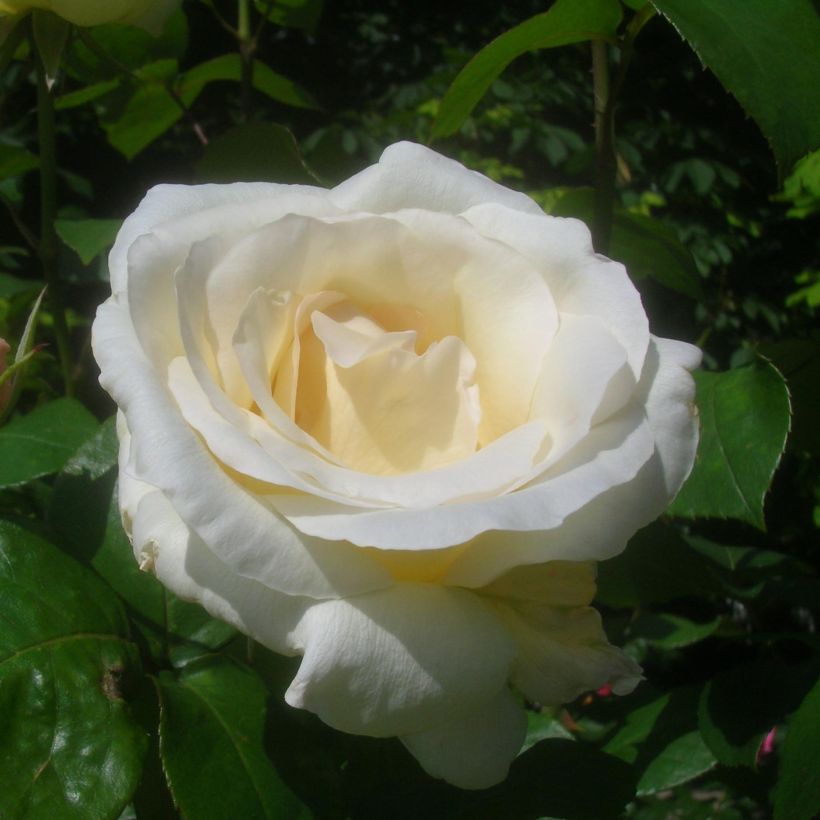

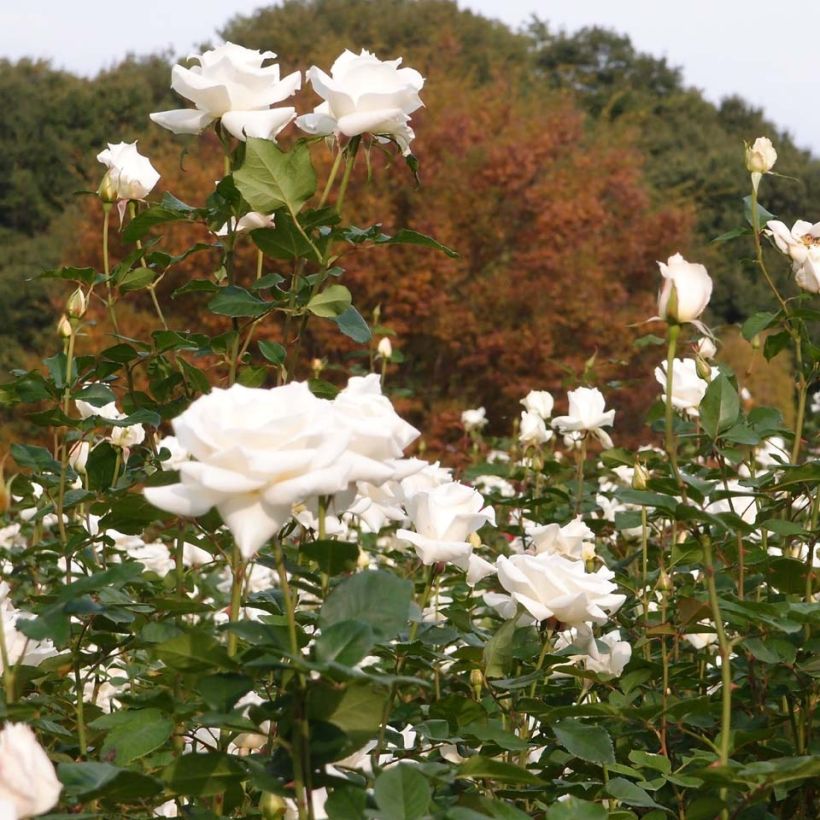

Plant habit
Flowering
Foliage
Botanical data
Rosa
Pascali®
Rosaceae
Hybrid Tea Rose
Cultivar or hybrid
Other Polyantha clustered Roses
Planting and care
Plant your Pascali Rose in a sunny or lightly shaded location. Modern roses are fairly tolerant but do not like excess limestone. They will thrive in any garden as long as the soil is well-worked, not too heavy, and rich enough. To plant your rose, work the soil well and place a base fertiliser, such as bonemeal, at the bottom of the planting hole. Water generously after planting to remove air pockets, then regularly for a few weeks to aid rooting.
Pruning modern repeat-flowering roses is essential for flowering. It is done in three steps:
1. Maintenance pruning: regularly shorten the branches that have bloomed during the season. To promote the repeat flowering of roses, remove faded flower clusters, leaving 2 or 3 leaves.
2. Autumn preparatory pruning: light pruning that anticipates the true spring pruning. It is not recommended in regions with cold winters as it can weaken the bush.
3. Spring pruning: in February-March, when the new shoots are 2 to 3 cm (1in) long, prune the young strong branches to a quarter of their length.
The purpose of pruning is always to clear the heart of the bush and remove dead wood, diseased branches, and weak shoots. The most vigorous branches, usually 3 to 6 well-positioned branches, should be kept, to maintain a beautiful shape. Always prune at an angle ½ cm or 1 cm (0.4in) above an outward facing bud.
Planting period
Intended location
Care
-
, onOrder confirmed
Reply from on Promesse de fleurs
Roses by purpose
Haven't found what you were looking for?
Hardiness is the lowest winter temperature a plant can endure without suffering serious damage or even dying. However, hardiness is affected by location (a sheltered area, such as a patio), protection (winter cover) and soil type (hardiness is improved by well-drained soil).

Photo Sharing Terms & Conditions
In order to encourage gardeners to interact and share their experiences, Promesse de fleurs offers various media enabling content to be uploaded onto its Site - in particular via the ‘Photo sharing’ module.
The User agrees to refrain from:
- Posting any content that is illegal, prejudicial, insulting, racist, inciteful to hatred, revisionist, contrary to public decency, that infringes on privacy or on the privacy rights of third parties, in particular the publicity rights of persons and goods, intellectual property rights, or the right to privacy.
- Submitting content on behalf of a third party;
- Impersonate the identity of a third party and/or publish any personal information about a third party;
In general, the User undertakes to refrain from any unethical behaviour.
All Content (in particular text, comments, files, images, photos, videos, creative works, etc.), which may be subject to property or intellectual property rights, image or other private rights, shall remain the property of the User, subject to the limited rights granted by the terms of the licence granted by Promesse de fleurs as stated below. Users are at liberty to publish or not to publish such Content on the Site, notably via the ‘Photo Sharing’ facility, and accept that this Content shall be made public and freely accessible, notably on the Internet.
Users further acknowledge, undertake to have ,and guarantee that they hold all necessary rights and permissions to publish such material on the Site, in particular with regard to the legislation in force pertaining to any privacy, property, intellectual property, image, or contractual rights, or rights of any other nature. By publishing such Content on the Site, Users acknowledge accepting full liability as publishers of the Content within the meaning of the law, and grant Promesse de fleurs, free of charge, an inclusive, worldwide licence for the said Content for the entire duration of its publication, including all reproduction, representation, up/downloading, displaying, performing, transmission, and storage rights.
Users also grant permission for their name to be linked to the Content and accept that this link may not always be made available.
By engaging in posting material, Users consent to their Content becoming automatically accessible on the Internet, in particular on other sites and/or blogs and/or web pages of the Promesse de fleurs site, including in particular social pages and the Promesse de fleurs catalogue.
Users may secure the removal of entrusted content free of charge by issuing a simple request via our contact form.
The flowering period indicated on our website applies to countries and regions located in USDA zone 8 (France, the United Kingdom, Ireland, the Netherlands, etc.)
It will vary according to where you live:
- In zones 9 to 10 (Italy, Spain, Greece, etc.), flowering will occur about 2 to 4 weeks earlier.
- In zones 6 to 7 (Germany, Poland, Slovenia, and lower mountainous regions), flowering will be delayed by 2 to 3 weeks.
- In zone 5 (Central Europe, Scandinavia), blooming will be delayed by 3 to 5 weeks.
In temperate climates, pruning of spring-flowering shrubs (forsythia, spireas, etc.) should be done just after flowering.
Pruning of summer-flowering shrubs (Indian Lilac, Perovskia, etc.) can be done in winter or spring.
In cold regions as well as with frost-sensitive plants, avoid pruning too early when severe frosts may still occur.
The planting period indicated on our website applies to countries and regions located in USDA zone 8 (France, United Kingdom, Ireland, Netherlands).
It will vary according to where you live:
- In Mediterranean zones (Marseille, Madrid, Milan, etc.), autumn and winter are the best planting periods.
- In continental zones (Strasbourg, Munich, Vienna, etc.), delay planting by 2 to 3 weeks in spring and bring it forward by 2 to 4 weeks in autumn.
- In mountainous regions (the Alps, Pyrenees, Carpathians, etc.), it is best to plant in late spring (May-June) or late summer (August-September).
The harvesting period indicated on our website applies to countries and regions in USDA zone 8 (France, England, Ireland, the Netherlands).
In colder areas (Scandinavia, Poland, Austria...) fruit and vegetable harvests are likely to be delayed by 3-4 weeks.
In warmer areas (Italy, Spain, Greece, etc.), harvesting will probably take place earlier, depending on weather conditions.
The sowing periods indicated on our website apply to countries and regions within USDA Zone 8 (France, UK, Ireland, Netherlands).
In colder areas (Scandinavia, Poland, Austria...), delay any outdoor sowing by 3-4 weeks, or sow under glass.
In warmer climes (Italy, Spain, Greece, etc.), bring outdoor sowing forward by a few weeks.

































